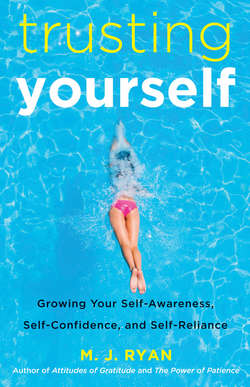Читать книгу Trusting Yourself - M. J. Ryan - Страница 14
На сайте Литреса книга снята с продажи.
We Don't Have to Worry So Much
ОглавлениеHow much pain have cost us the evils which have never happened.
—Thomas Jefferson
The mother of one of Ana's classmates organized an “end of the school year” party at a park. The weather had been atrocious all month, but that Saturday it was warm and sunny, just the kind of weather for being outside. I commented to the organizer how fortunate we were that the day was nice. “Oh, yes,” she said, “I was worried all week that it would be raining.”
Now I've spent a great deal of my life worrying and trying every technique known to humankind to stop. I used to say that if I could get paid even a dollar per worry, I'd be a millionaire. So when someone mentions being worried, my heart goes out to her or him. This time something else occurred as well. I thought, This person worried for days about something she could not control, which ended up just fine anyway. What a waste of time and energy!
I've been there so many times myself. Hearing it from someone else made me realize that I had changed. I actually worry less than I used to—not never, but much less. And the reason is that I've learned to trust more and more in my capacity to handle whatever life throws at me. Rain on a picnic day? We'll postpone it or move it indoors. Will my boss like the proposal? I'll redo it if she doesn't.
Worry is always about the future, even if it's the next minute. And what we are really worried about is our capacity to deal with that future: our child's disappointment, the test results, our work performance. We're anticipating that we won't be able to cope. So we worry—as if that will help create a good outcome (which of course it almost never does). Mostly it just frazzles our nerves and wears us down.
In The Positive Power of Negative Thinking, Julie Norem points out that there are actually two types of worries: those you can do something about and those you can't. If you are worried, for instance, about freezing up during a speech, you can practice more or use notes. When you use the worries that can be dealt with to plan ahead, you actually meet with greater success.
The more we come to deeply know our thinking talents and trust in our capacity to cope, the less time we have to spend in worry. We take action on those worries that we can and know that we'll somehow figure out how to cope with the ones we can't or get appropriate help if they come to pass.
For those of us not born with self-assurance, this doesn't happen through simplistic affirmations (“I will stride confidently through life and think only good thoughts”). For most of us, trusting ourselves comes through experience—having the opportunity to prove to ourselves we can handle a particular situation. And it comes through reflecting afterward on that experience and using it as a resource when a potential worry arises. It also comes from being flexible—understanding that there are a variety of possible responses to any given situation and relying on our capacity to find an appropriate response.
I had occasion to recall this recently. My editor, agent, and I were struggling with a subtitle for this book. I could have worried. Titles are so important, what if we can't come up with the right one? I could have stayed up nights racking my brains and pulling my hair out. Instead I thought, Well, we're not there yet, but I have done this many times before. Plus there are many possible answers. I trust in our ability to come up with something that will work. And so I got to enjoy those weeks before we settled on something much more than I would have if I'd worried.
This relief from worry is profound. We don't have to expend all that emotional energy anymore. We don't have to live in fear of the future. We're free to be in the present moment, that elusive destination of spiritual pundits of all stripes. When we trust ourselves, now is a place we can rest happily in.
